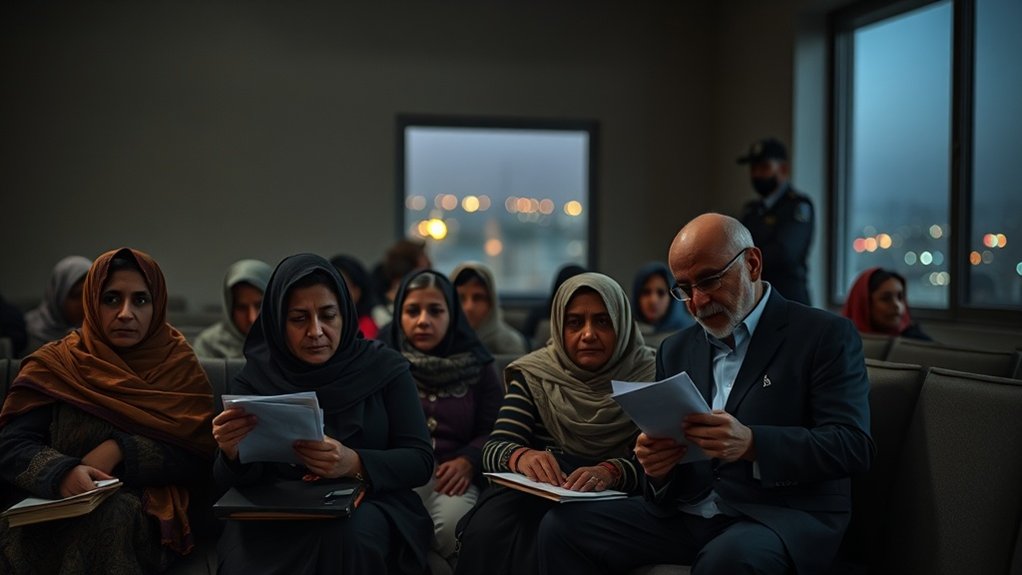If you’re facing Afghan humanitarian status renewal, you’ll notice things aren’t as straightforward as before. Policies have shifted, and the documents you’re now expected to provide can get confusing. Missing just one item could set you back months—or worse. With stricter scrutiny and changing requirements, you need a clear plan so mistakes don’t cost you your status. Let’s explore what really matters for your application and what steps can keep you ahead.
Understanding Humanitarian Status for Afghan Nationals

Whether you’ve just arrived in the United States or have been here for a while, it’s important to understand what humanitarian status means for Afghan nationals. Humanitarian status refers to specific protections granted to individuals from Afghanistan who can’t safely return home due to conflict, violence, or risk of persecution. With this status, you may temporarily remain in the U.S., access certain benefits, and work legally while your underlying situation is evaluated or until you can safely return to Afghanistan.
You’ll find that humanitarian statuses include Temporary Protected Status (TPS), Humanitarian Parole, or asylum. Each status has distinct qualifications, durations, and rights attached, so it’s crucial to know under which category you fall. If you hold any of these protections, you’re required to comply with U.S. laws and update your status as needed. Understanding your specific category helps ensure you maintain your rights and stay legally protected during your time in the country.
For Afghan nationals seeking to keep their protections, obtaining expert guidance from an immigration lawyer increases your chances of renewing your status without errors or delays.
Recent Changes in Government Policies and Their Effects
You’re now facing several new changes in government policy that may affect your ability to renew humanitarian status. These updates include shifts in eligibility rules, adjusted documentation requirements, and revised processing timelines. It’s important to understand how these developments might impact your renewal process. Consulting with qualified professionals can provide clarity on specific documents required and help you navigate recent policy changes effectively.
Policy Amendments Impacting Eligibility
As government agencies introduce new policy amendments, the criteria for Afghan humanitarian status renewals continue to shift, creating uncertainty for many applicants. You now face frequent updates regarding eligibility, which means you must stay alert to changing requirements. These policy changes may narrow the scope of who qualifies, sometimes requiring evidence of more direct risk or altering definitions of vulnerability. You could find that something which made you eligible last year may no longer suffice. Additionally, these evolving policies can introduce new quotas, review timelines, or discretionary factors that weren’t previously considered. It’s essential for you to monitor official announcements so you don’t miss critical updates. Staying current ensures you react promptly to any changes that could affect your chances of renewal. For these reasons, specialized legal support can be vital, as knowledgeable attorneys help you interpret and comply with evolving regulations to avoid missed opportunities or delays.
Documentation Requirements Updates
Since government policies often shift with little notice, staying on top of the latest documentation requirements is crucial for Afghan humanitarian status renewals. If you don’t keep your paperwork updated, you risk delays or even denial. Recently, authorities have tightened the standards for document validity and authenticity. It’s now essential to submit certified translations and provide additional proof of your identity or residency. You also need to promptly update any changes in your personal circumstances. For those applying or renewing, consulting with professionals about personalized analysis can greatly reduce the risk of error during the process. The following table highlights some key documentation elements and recent updates:
| Document Type | Recent Update |
|---|---|
| Identity Proof | Must be notarized and translated |
| Residency Evidence | Bank or utility bills now required |
| Birth Certificates | Apostille now mandatory |
| Employment Proof | Recent pay slips or contract needed |
| Application Forms | Only digital submissions accepted |
Processing Timelines Adjustments
Although many applicants expect a straightforward process, recent government policy changes have significantly altered processing timelines for Afghan humanitarian status renewals. Now, you’ll notice increased scrutiny and additional security checks, which can lead to unpredictable delays. Since early 2024, authorities have implemented stricter background reviews and verification steps, aiming to address security and fraud concerns. As a result, applications that previously took weeks may now stretch into several months.
You’ll need to prepare for these longer timelines when planning your submissions or travel. It’s crucial to monitor updates from immigration authorities and maintain thorough documentation, as any missing or unclear information can further slow the process. By staying proactive and responding promptly to requests, you can reduce avoidable setbacks and protect your legal status during this period of change. Seeking guidance from a specialized immigration lawyer is especially helpful, as their expertise can significantly increase your chances of a successful and timely renewal.
Documenting New Personal and Family Situations
When you’re applying to renew your Afghan humanitarian status, updating your application to reflect any changes in your personal or family situation is essential. You need to provide accurate, up-to-date information about marital status, births, deaths, or changes in family composition since your last submission. Don’t assume minor changes can be overlooked—officials rely on your documentation to assess eligibility and determine your continued protection.
Gather all relevant paperwork, such as birth certificates, marriage or divorce records, and proof of family relationships. If you’ve moved, include updated proof of address. Clearly label and organize these documents before submission to streamline processing and avoid unnecessary delays. Make sure translations for any non-English documents are certified and complete. For the best chance of approval, consider seeking specialized legal assistance to help you navigate the process and avoid mistakes that could result in delays or complications.
Addressing Safety Concerns and Emerging Threats

Because your safety is a top priority in the renewal process, you should clearly describe any new risks, threats, or incidents you’ve faced since your last application. Make sure to outline situations that put you or your family in greater danger, such as targeted harassment, increased surveillance, or changing conditions in your home region. Don’t minimize details—share specifics about where, when, and how these threats occurred.
Be candid if new groups, policies, or local events now threaten your well-being. Highlight changes in your community, employment, or social circle that have impacted your sense of security. It’s important to emphasize whether old threats have worsened or if entirely new dangers have emerged since your initial request.
Stressing these points communicates to authorities why your need for humanitarian protection remains urgent. By staying factual and up-to-date, you ensure your situation is fully understood and your case receives careful attention. It is also helpful to mention if you have faced legal repercussions such as fines or deportation as a result of your status or circumstances, as these details can further support the urgency and necessity behind your renewal request.
Required Documentation for Renewal Applications
When you apply to renew your Afghan humanitarian status, you’ll need to gather specific documents. Make sure your identity verification is current and ready to submit. You should also collect evidence that shows any changes in your circumstances since your last application. For the best chances of success, it’s important to seek guidance from a legal professional with experience in Brazilian immigration law who can assist you in preparing the necessary paperwork.
Updated Identity Verification Documents
Anyone preparing to renew Afghan humanitarian status needs to gather updated identity verification documents before submitting an application. You must ensure that all personal data matches exactly with the information in your original application and previous renewals. Check the expiration dates on your passport, national ID card, or any other identification you plan to submit—expired documents may delay the process or result in an outright rejection.
If your original documents aren’t available, secure certified copies or official replacements as soon as possible. Translations must be accurate and professionally certified if your documents aren’t in the language required by immigration authorities. Make digital copies of everything before submission. By updating and double-checking your identity documents, you’ll minimize errors, ensure faster processing, and avoid unnecessary complications during the renewal process.
It’s highly advisable to seek specialized legal support when navigating Afghan humanitarian status renewals, as attorneys can prevent procedural errors and actively monitor your application for compliance with changing U.S. immigration requirements.
Proof of Changed Circumstances
If your situation has changed since your last Afghan humanitarian status application, you’ll need to submit clear evidence to support your renewal. Authorities want to see actual documentation proving that your need for protection is ongoing or has intensified. Gather records like updated police reports, medical documents, or recent letters from aid organizations. Consistency is key, so your paperwork should reflect recent changes, such as threats, displacement, or health issues.
Use this table to visualize helpful documentation:
| Change in Circumstance | Recommended Document | Notes |
|---|---|---|
| New threat or risk | Police report, affidavits | Dated within the last 12 months |
| Deteriorating health | Medical certificates | Signed by licensed healthcare provider |
| Loss of housing | Eviction notice, shelter letter | Should be current and detailed |
Submit all documents in the original language plus certified translations.
It is especially important to avoid common errors during this process, as even minor mistakes in documentation can lead to delays or complications with your renewal.

Although the process may seem daunting, renewing your Afghan humanitarian status becomes manageable when you follow each step carefully. First, review your original status documents and note your expiration date. Start early—don’t wait until the last minute. Gather documents that show your current situation and any changes since your initial application. This includes proof of residence, identification, and updated evidence of humanitarian needs.
Next, complete the renewal application form accurately. Double-check all details before submitting. Attach your supporting documents in the required format and order, following the agency’s specific instructions. Submit your application through the designated online portal or by mail, as required.
After submission, keep copies of everything, including receipts or confirmation emails. Track your renewal status online if possible. If the immigration office requests further information or clarifications, respond promptly. Finally, wait for the official decision, and be prepared for possible follow-up steps if needed.
Common Challenges and Practical Solutions
While renewing your Afghan humanitarian status, you might face several obstacles that can slow down or complicate the process. You’re not alone—many find this journey overwhelming. Gathering updated documents, adapting to shifting legal requirements, and waiting for unpredictable timelines can test your patience and resolve. Sometimes, you might feel discouraged or anxious about the future. But you can better manage these feelings and challenges by knowing what to expect and having solutions ready.
Here are frequent hurdles and actions you can take:
- Missing crucial documents—reach out to community groups or NGOs for help.
- Confusing legal instructions—consult with a qualified immigration lawyer.
- Language barriers—find translation assistance or bilingual support services.
- Delayed processing—regularly check your application status and stay in contact with authorities.
- Emotional stress—seek support networks or counseling for mental well-being.
Facing these challenges, remember, you have resources and options to support your renewal.
Frequently Asked Questions
How do I renew my Afghan passport online?
Currently, renewals are requested through Afghan embassies/consulates, with limited online pre-registration.
Is a Brazil humanitarian visa open for Afghanistan in 2025?
Yes, Brazil continues offering humanitarian visas for Afghans under special migration policies.
Does the Afghan citizen card have an expiration date?
Yes, it usually expires after 5–10 years, requiring renewal to remain valid.
What is a P1 and P2 visa for Afghanistan?
They are U.S. refugee programs: P1 for individuals referred by UN/NGOs, P2 for groups with specific risks.
How Long Does the Renewal Process Typically Take for Afghan Applicants?
You’ll usually wait between three to six months for your humanitarian status renewal to process, though this timeline can vary. You should apply as soon as possible, ideally several months before your current status expires. Delays can happen if you don’t provide all required documents or if the office processes a high volume of applications. Stay proactive—track your application online and contact the authorities if you don’t get updates in a reasonable time.
Are There Legal Fees Associated With Renewal Applications?
Yes, you’ll usually have to pay legal fees when you submit your renewal application. These fees can cover attorney consultations, document preparation, and sometimes government filing fees. Costs vary depending on your lawyer and how complicated your situation is. It’s a good idea to ask for a clear estimate upfront, so you won’t face surprises. If you’re struggling financially, you might find organizations or legal clinics that offer reduced fees or free assistance.
Can Minors Apply Independently for Humanitarian Status Renewals?
No, as a minor, you generally can’t apply independently for humanitarian status renewals. You’ll need a parent, legal guardian, or appointed adult representative to submit your renewal application on your behalf. Authorities require this to ensure your best interests are protected and all legal requirements are met. It’s important to coordinate with a responsible adult who understands the process and can provide the necessary documentation and support throughout your renewal application.
What Language Should Supporting Documents Be Submitted In?
You should submit all supporting documents in the official language of the authority processing your application, which is usually English or the relevant country’s local language. If your originals are in another language, you’ll need to provide certified translations. Make sure the translations are accurate and complete, including all stamps and signatures. Otherwise, the authorities might reject your application or request additional information, causing unnecessary delays in your humanitarian status renewal process.
Is In-Person Attendance Required for Renewal Interviews?
You don’t always have to attend renewal interviews in person; some organizations allow for remote or virtual interviews, depending on their policies and your location. However, certain cases may require in-person attendance, especially if identity verification or biometric data collection is necessary. Always check the specific instructions you receive, as requirements can differ. If you can’t attend in person, contact the authorities in advance to request alternative arrangements or rescheduling.
Conclusion
Renewing your Afghan humanitarian status can feel overwhelming, especially with shifting policies and stricter documentation rules. Don’t take chances—make sure your identity proofs are notarized and all evidence is properly translated. Stay proactive about safety concerns and new circumstances in your life. With professional guidance from Vieira Braga Advogados, you’ll navigate the renewal process smoothly, avoid unnecessary delays, and safeguard your status in the U.S. Make every document count—your future depends on it.

